FREE Training: How to Launch Your Property Management Company
Are you a property manager in Idaho that is looking to start your own company, but you’re not quite sure where to start?
Well, you have come to the right place!
Establishing a brand new property management company in Idaho can feel overwhelming, especially if you are new to the industry.
From registering your business and securing new clients to building your team and finding trusted local contractors, the initial phases of your company may feel stressful and daunting.
However, there are many things that you can do to make things easier on yourself and avoid the common mistakes that many new professionals often make in property management.
Understanding the Role of a Property Management Company in Idaho
At its core, a property management company acts as a liaison between property owners and tenants, handling a long list of responsibilities in order to maintain and enhance the value of rental properties.
While the specific duties of a property manager primarily depends on your own niche and specialty, here are the main responsibilities that you can expect on your to-do list:
- Filling vacancies and managing tenants: Property managers are responsible for attracting and retaining tenants. This involves marketing vacant properties, conducting tenant screenings, and addressing tenant concerns and inquiries promptly.
- Property Maintenance and Repairs: Maintaining the physical condition of the property is crucial to making sure that the property remains profitable for your clients and your tenants remain happy. Property management companies oversee routine maintenance tasks, coordinate repairs, and ensure compliance with safety and building codes.
- Financial Management: From rent collection to budgeting and financial reporting, property managers generally handle all of the financial aspects of property ownership. This includes setting rental rates, managing operating expenses, and optimizing revenue streams.
- Legal Compliance: Navigating the complex web of landlord-tenant laws and regulations is crucial to avoiding legal disputes. Property managers stay up to date on all of the local and state regulations, ensuring compliance in all aspects of the rental property’s operations.
- Risk Management: Identifying and mitigating risks is essential to protect both property owners and tenants. Property management companies implement strategies to minimize liability and safeguard the interests of all parties involved.
- Following Up With Leads: Attracting and nurturing leads is crucial for property managers to ensure a steady flow of property owners interested in their management services. You must use proactive follow-up methods to convert inquiries into partnerships.
What Does It Take to Be a Successful Property Manager in Idaho?
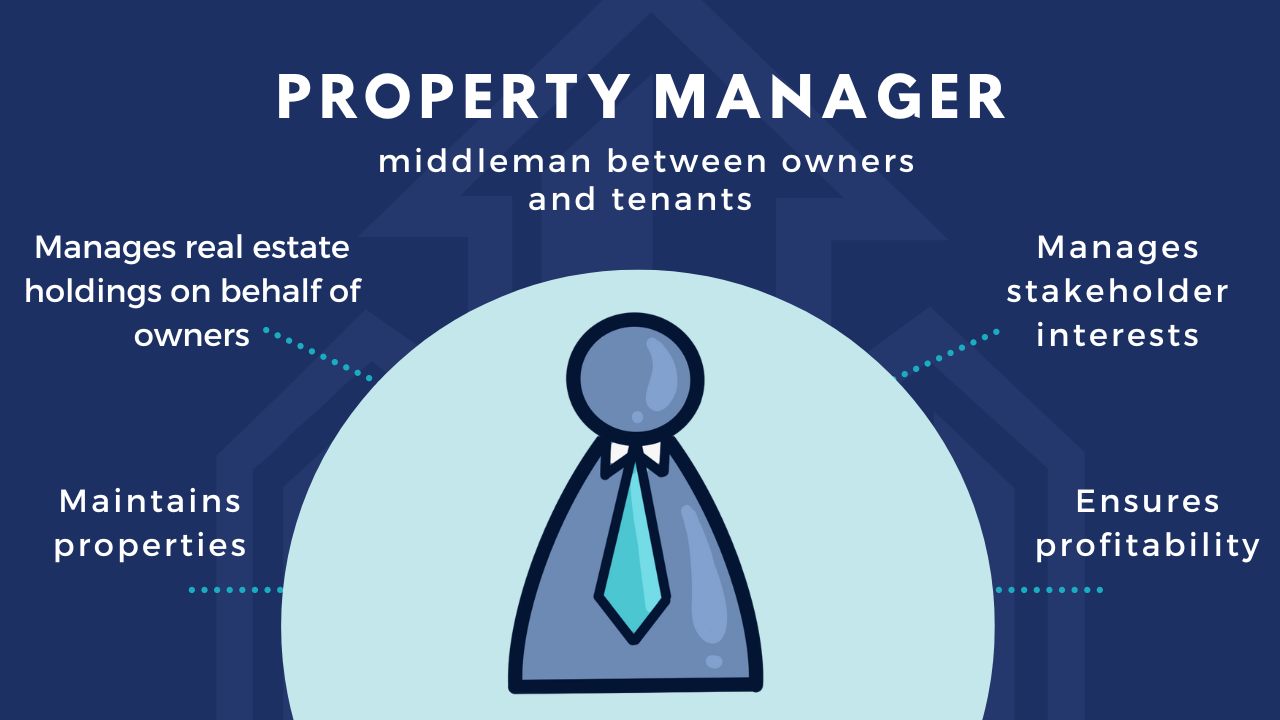
Now that you know what a property manager does, let’s talk about what it takes to succeed in the field. The truth is, being a successful property manager requires many skills and qualities, including the following:
- Communication Skills: Effective communication is the cornerstone of successful property management. At the end of the day, property management is a job that requires you to be able to maintain positive relationships with many different types of people. Property managers must communicate clearly and professionally with property owners, tenants, and contractors, acting as a mediator to make sure that everyone’s needs are met.
- Attention to Detail: Property management involves juggling numerous tasks simultaneously. Attention to detail is crucial to make sure that nothing falls through the cracks and that all aspects of property management are taken care of.
- Problem-Solving Abilities: Inevitably, challenges and issues will arise in property management, and you will need to be able to put out fires when they come up. Successful property managers possess strong problem-solving skills, allowing them to address issues quickly and find effective solutions.
- Financial literacy: A solid understanding of financial principles is essential for effective financial management. Property managers should be adept at budgeting, financial analysis, and optimizing revenue streams to maximize profitability for property owners.
- Adaptability: The real estate market is constantly evolving, and property managers must be adaptable to navigate changing trends, regulations, and market conditions effectively.
So, now that you know what it takes, are you still interested in starting your own Idaho property management company? If so, you’re in luck, because we have put together a guide to help you get started. Let’s dive in!
Step 1: Decide Your Idaho Property Management Company’s Business Structure
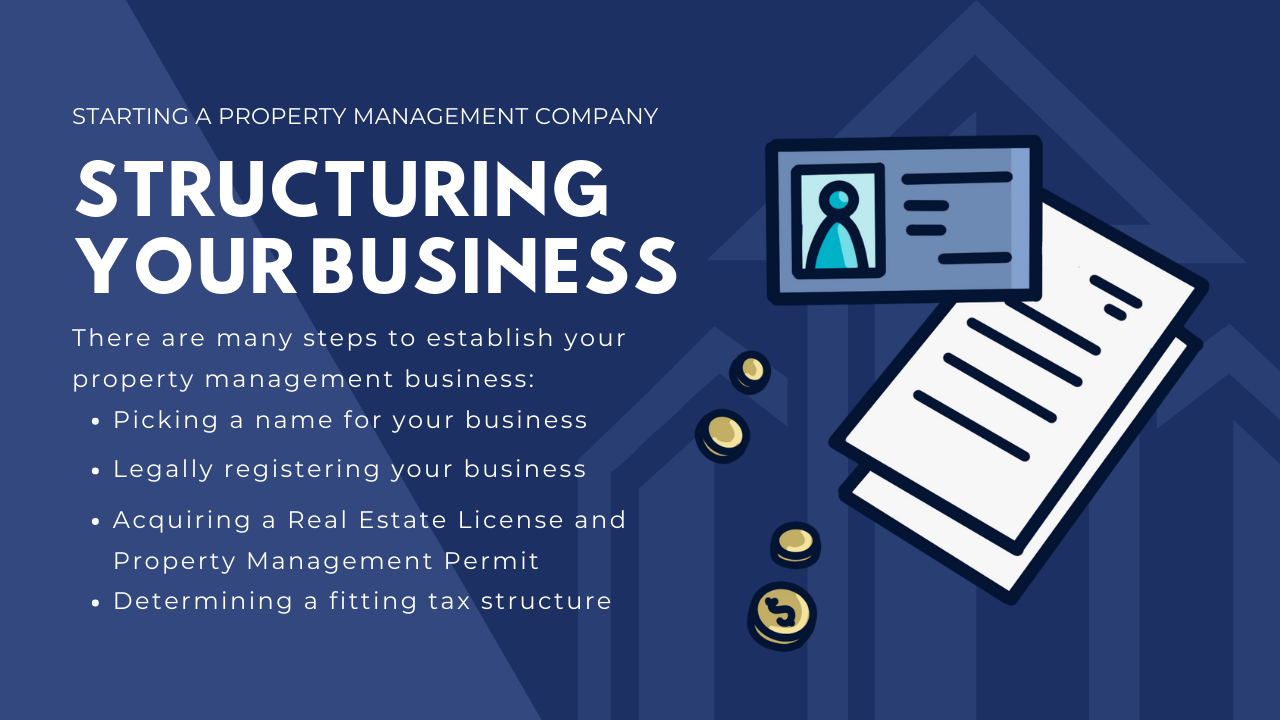
Launching your property management company on the right foot starts with selecting a compelling and memorable name for your company and formally registering your business.
The intricate legal details of business setup in Idaho can present its own array of hurdles, so working closely with a corporate accountant or tapping into resources such as your local Chamber of Commerce is highly advisable.
At this point, coming up with a strong business plan becomes imperative. A well-designed business plan serves as a roadmap for your property management company, and in the long run it will help you make informed decisions regarding your property management company’s business structure and how you will protect both your personal and professional interests against liabilities.
It is important to note that each state, including Idaho, has their own set of legal rules and regulations for business establishment, particularly in the realm of property management.
Before you start to get too ahead of yourself, it is important to make sure that you are qualified to be a property manager. In Idaho, Property Management Certification requires a Real Estate Broker License.
So, now that you have been properly certified and your business has been registered, you can finally begin to craft your business plan.
Many property management companies gravitate towards Limited Liability Corporations (LLCs) or unincorporated entities (commonly known as S-Corps or C-Corps).
Consulting legal or financial experts well-versed in corporate tax regulations is highly recommended to decide what the most ideal structure will be for your property management company.
FREE Training: How to Launch Your Property Management Company
Step 2: Make a Solid Contract for Your Future Clients in Idaho
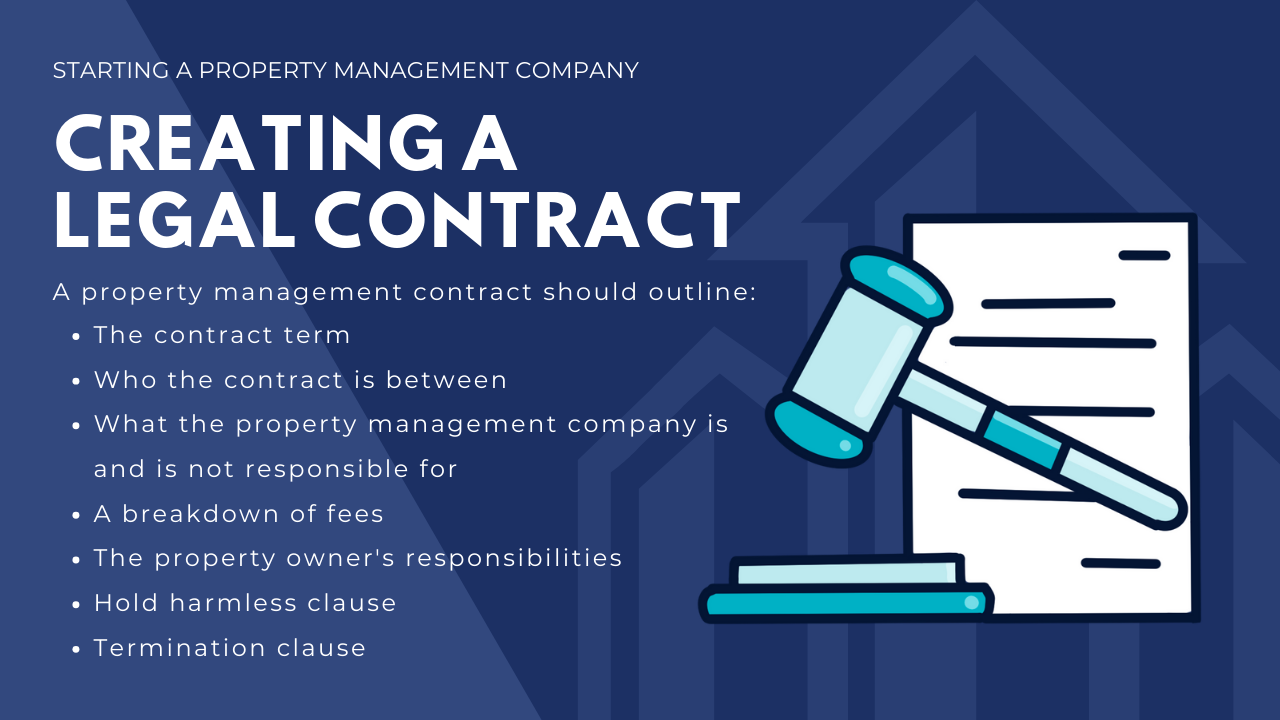
Once your Idaho property management company has been officially registered as a legal entity and you have started to shape your business plan, you will need to create a strong, legally-binding contract that is uniquely tailored for your clients in Idaho.
We strongly advocate initiating this process early in your property management journey, as it may require a considerable investment of time and finances, particularly in attorney fees.
Collaborating with a specialized attorney in property management can help you make sure that you are adhering to all the local legal protocols and protecting yourself against liabilities, fraud, and other associated risks that tend to come along with property management.
Now, you may be wondering, what makes a strong client contract? What should you include to make sure that you are being properly protected long term?
A Property Management Contract Should Clearly Outline the Below:
- Duration of the contract.
- Identification of all parties involved in the contract (i.e., your company and the property owner).
- A detailed outline of all the responsibilities belonging to the property management company, such as property maintenance, tenant acquisition, rent collection, repairs, emergency maintenance, and other recurring monthly obligations.
- A detailed outline of what your property management company is not responsible for
- Transparent breakdown of fees payable by the property owner to the property management company.
- Specification of duties and obligations that the property owner is responsible for
- Inclusion of a hold harmless clause, absolving one or both parties of legal liabilities in the event of injuries or damages sustained during the contract period.
- A termination clause, stipulating conditions under which either party can dissolve the contract with or without penalties.
By meticulously outlining these details within your contract, property managers can not only establish clarity and transparency with their clients but also set in place a strong legal safeguard to protect the interests of all parties involved.
FREE Training: How to Launch Your Property Management Company
Step 3: Create a Business Plan for Your Idaho Property Management Company
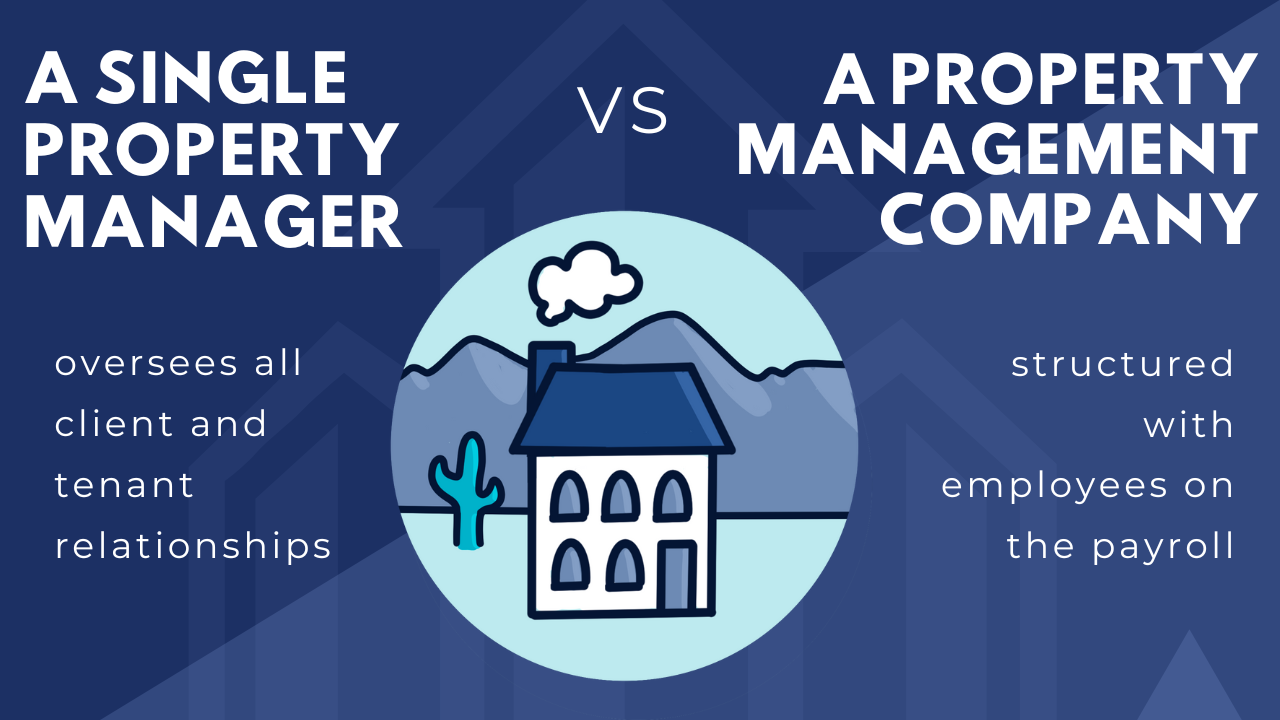
When you are creating a business, it is essential to envision both your short and long-term goals and come up with ways in which you can meet those goals.
You can do this by creating a plan for your business. After all, without defining your goals and making a plan to reach them, how are you going to thrive long term?
First, you will want to choose a structure for your company.
Property Management Companies Generally Adopt One of Two Structures:
- Single Property Manager Model: Here, a single property manager oversees all client and tenant relationships, with the option to delegate tasks to other businesses or contractors.
- Employee-Based Property Management Company: This structure involves hiring employees, ensuring a more balanced workload distribution, with each employee focusing on specific aspects of the business.
When it comes to choosing a structure for your property management company, adaptability is key for long term success.
Many property managers start as sole proprietors, collaborating with contractors to manage their workload.
Then, as the business continues to expand, the focus shifts towards hiring employees and establishing a typical structured hierarchy.
When it’s time to grow your property management company, assembling a team of professionals becomes essential to help you manage your daily workload effectively. Consider filling the following roles:
- Additional Property Managers: Oversee multiple properties, ensuring high-quality service.
- Administrative Support: Boost office efficiency and daily operations.
- Sales Representatives: Cultivate client relationships and attract new ones.
- Human Resources Specialists: Manage payroll and benefits.
- Finance Professionals: Handle accounts payable and receivable.
- Leasing Agents and Tenant Managers: Manage tenant relations and secure new tenants. This is especially useful if you have a vacation rental, as there are higher tenant turnover rates.
- Maintenance Managers and Staff: Handle routine and emergency maintenance.
- Service Coordinators: Facilitate seamless day to day operations.
- Marketing Specialists: Aid in website development, social media management, and marketing materials creation.
Additionally, contract-based roles are vital when it comes to property management. These include:
- Accountant: Provide financial expertise.
- Real Estate Attorney: Ensure legal compliance.
- Contractors: Handle specialized maintenance tasks.
- IT Staff: Maintain technology infrastructure.
Step 4: Choose a Property Management Software to Help You Automate Your Operations
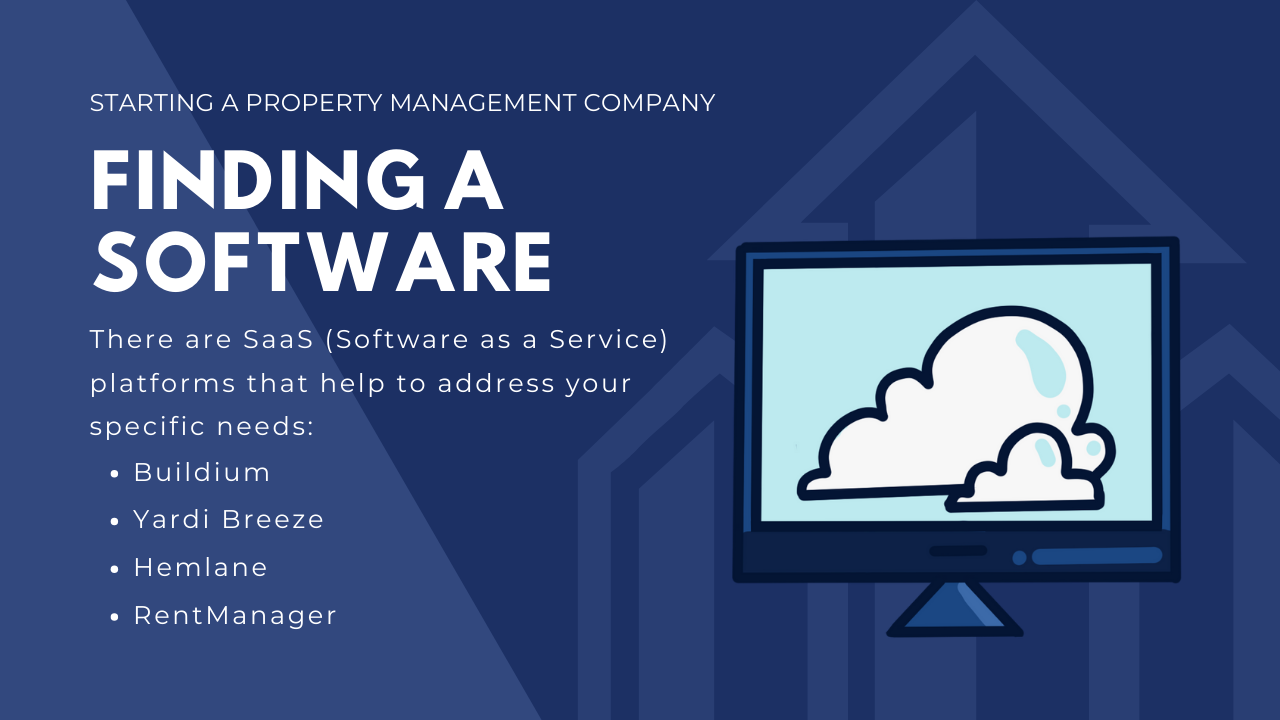
When you work in property management, you will face a constant stream of competing priorities that are vying for your attention every day.
However, you will need to be able to respond and address every issue quickly and professionally, or else your reputation and relationships with clients may suffer.
Effectively managing all of these priorities requires the right tools. Fortunately, software solutions can help you out.
Selecting software that seamlessly adapts to both current and future business requirements is an important decision, and we’re here to help guide you through it.
While comprehensive property management software such as Buildium, Yardi Breeze, Hemlane, and RentManager exist, they may appear overwhelming, particularly for new property management companies.
However, there are alternative Software-as-a-Service (SaaS) platforms tailored to specific needs such as tenant rent collection, maintenance order tracking, email organization, and document sharing.
Though these individual platforms may lack the integration of comprehensive software, they often offer greater cost-effectiveness and can aid in business scalability during the initial stages.
With diligent research, you can find an excellent SaaS solution to support your property management company’s needs.
FREE Training: How to Launch Your Property Management Company
Step 5: Market Your Property Management Company

Once your property management company has every detail in place to help set you up for success, you will need to start attracting new clients!
This is primarily done by crafting an effective marketing strategy to help build your brand identity and attract clients to your Idaho property management company.
In order to establish credibility, it is imperative to build a strong digital and local marketing presence. Many property managers choose to outsource marketing tasks to agencies or freelance professionals.
For example, our team at Upkeep Media specializes in helping property management companies build their online presence and attract clients. In your marketing plan, you should include the following:
An Engaging and Informative Website
In today’s digital era, a top-notch website serves as your digital storefront. Without a good website, it will be hard to turn new leads into real life clients.
First impressions matter, and a professional, informative, and well-designed website significantly impacts your ability to attract clients.
While platforms like WordPress, Squarespace, and Wix offer some DIY website templates, consider professional assistance to elevate your online brand.
Strong Marketing Collateral
Marketing collateral encompasses various materials promoting your business, such as social media posts, ads, business cards, brochures, digital guides, and blog posts.
Networking Opportunities
Despite the importance of digital marketing, real-life networking remains crucial for property managers. Building relationships with real estate professionals and investors can help you gain valuable industry contacts and leads.
Active involvement in professional organizations like the National Association of Residential Property Managers is recommended, providing industry insights, training, resources, and networking opportunities.
Research and attend relevant events to network with fellow Idaho real estate professionals.
Step 6: Determine What Your Property Management Company’s Fee Structure Will Look Like
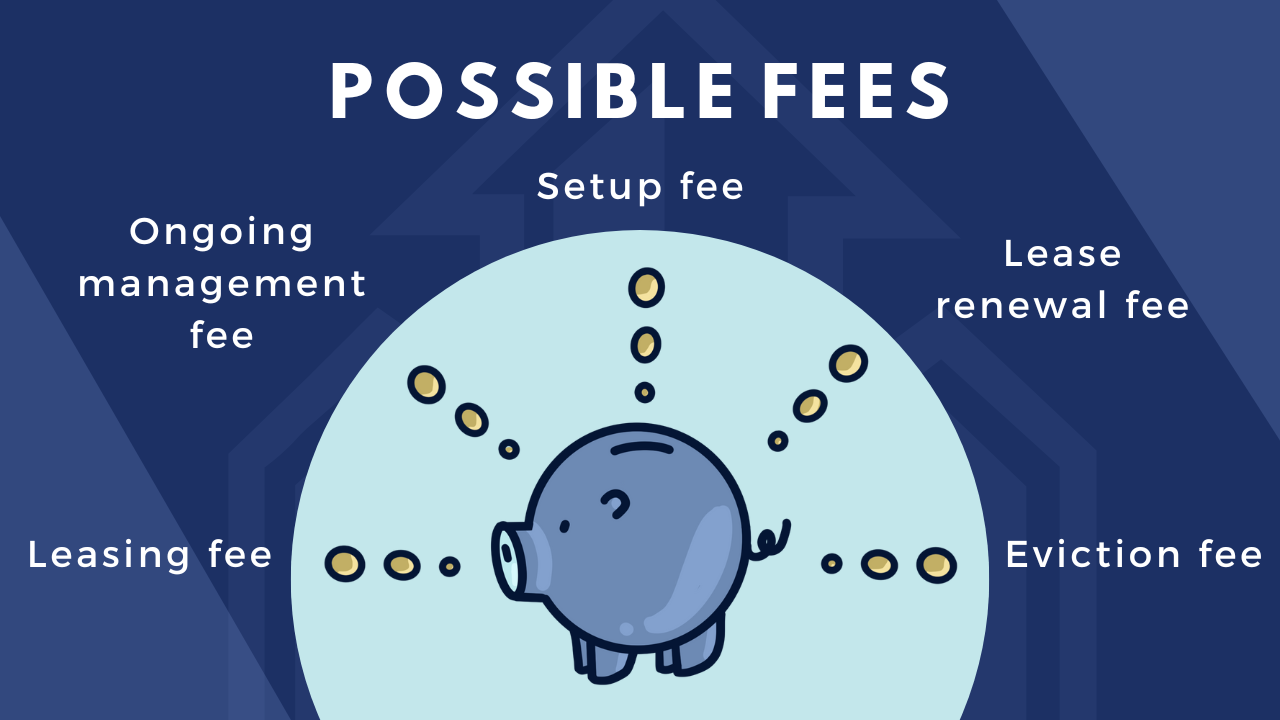
Once you have established your business structure and begun attracting new clients, the next critical step is to define your fee structure.
This is crucial to get right. Setting prices too low can make it difficult, or even impossible, for your company to make a regular income, while excessively high pricing may deter potential high-quality clients and ultimately harm your business.
Crafting a fee structure that ensures sustainable income and appeals to clients begins with taking the time to understand your local market in Idaho and your competitors’ pricing.
After you have done your competitive market analysis, you can go even farther by examining all of the unique fees and payment structures that are common in the industry.
Given that fees can vary significantly by city, focusing your search is recommended, rather than relying solely on general online guidelines.
When you are in the process of formulating your pricing structure, consider incorporating various fees, including:
- Setup Fee: A one-time charge property owners pay to establish an account, typically ranging from $200 to $300.
- Ongoing Management Fee: The primary source of monthly income, usually 3-10% of the property’s monthly rental income, covering your company’s daily operational costs.
- Leasing Fee: This is charged when a unit becomes vacant, typically equivalent to one month’s rent or a portion thereof.
- Lease Renewal Fee: Occasional fee paid by tenants upon renewing existing leases, typically a few hundred dollars.
- Eviction Fee: Optional but advisable if acting as the property owner liaison during an eviction process.
Regardless of your pricing strategy, it’s crucial that your rates reflect the quality of service provided.
Consistently delivering top-tier service to all clients will enhance your business reputation and drive overall profitability.
FREE Training: How to Launch Your Property Management Company
Step 7: Make Sure That You Are Always Providing High Quality Service
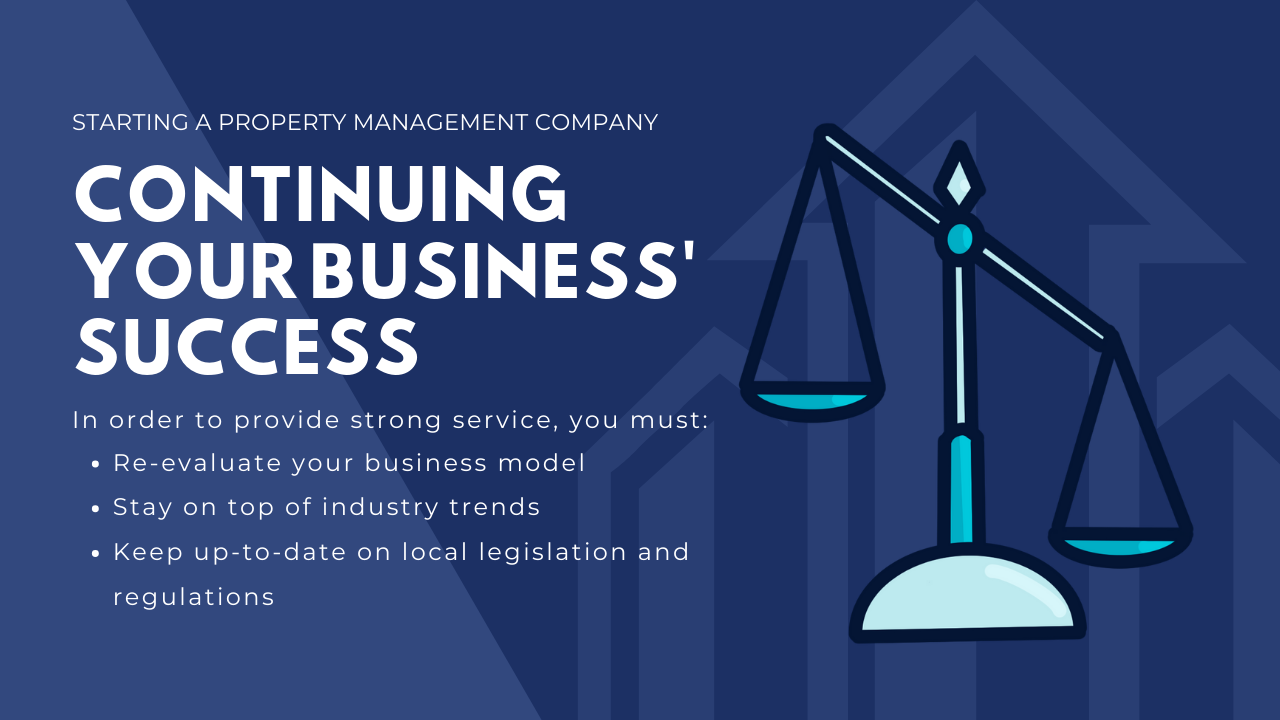
At the end of the day, after your Idaho property management company is up and running, you will need to make sure that you are always providing the highest quality services possible.
This is the only way to truly ensure your long term success in property management! By providing top notch services, you will be able to keep tenants and clients on a long term basis.
This ultimately solidifies your place in the industry and ensures that you always have a steady income that you can rely on. When all is said and done, the quality of your services is what matters most!
If you have any further questions, we’re here to answer them! Contact our team at Upkeep Media for our expert digital marketing services.



